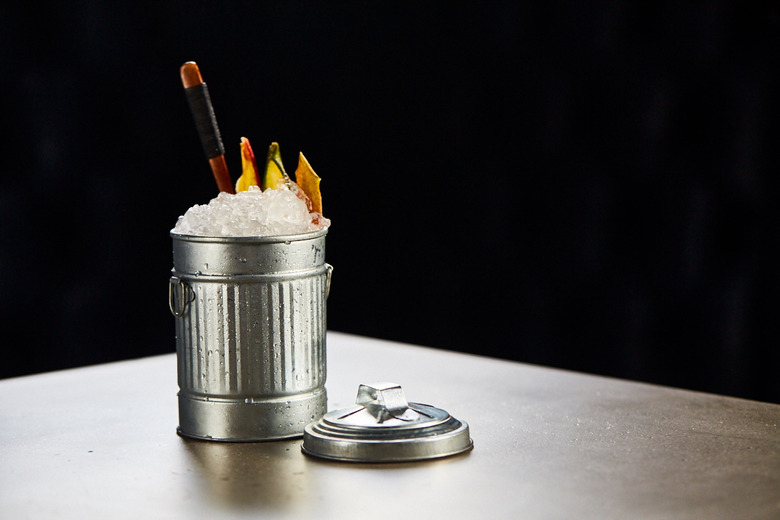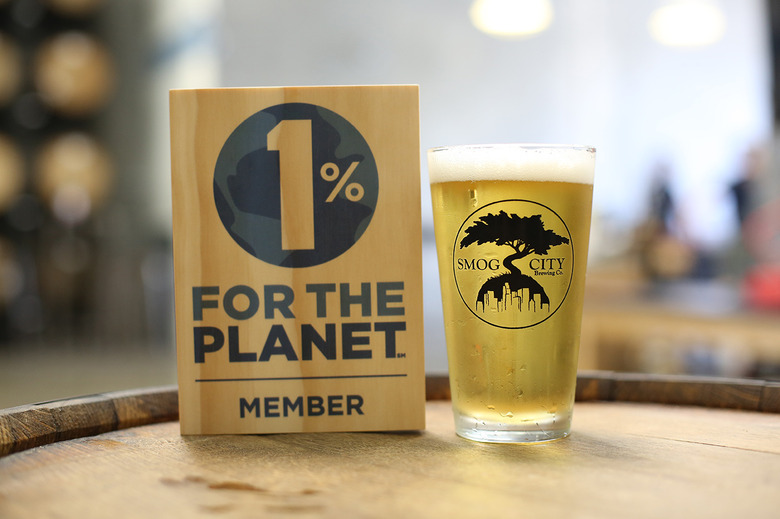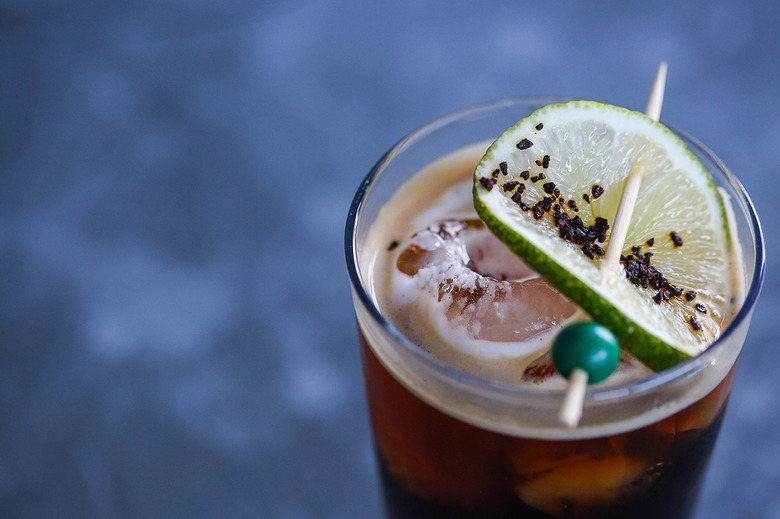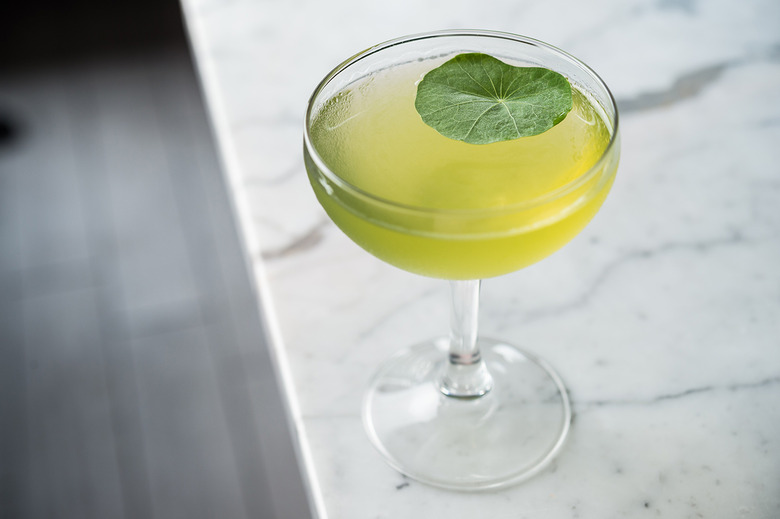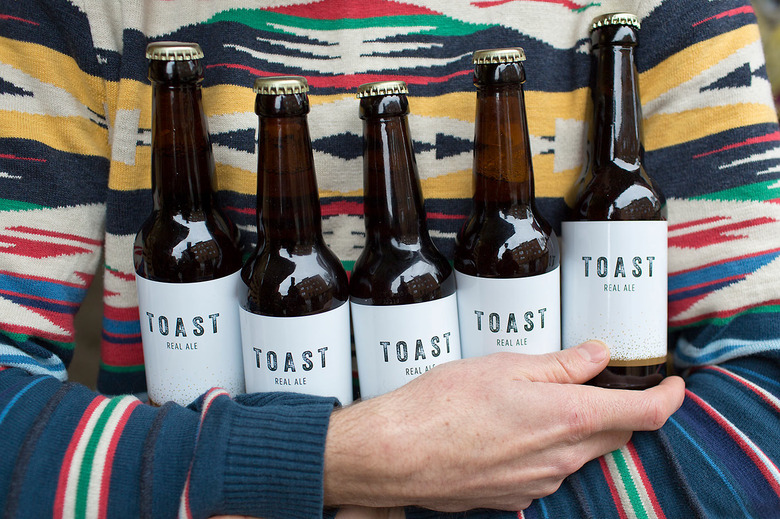How To Fight Food Waste With Booze
Bartenders are fighting food waste, one "trashy" cocktail at a time
Next time you're out at a bar and order a margarita, consider the lime juice: The drink wouldn't be the same without it. But what happens to all those squeezed limes? Would you be tempted to throw back another drink if you knew they were being put to good use?
It's no secret at this point that waste is one of the most pressing issues facing the food world today. But what might come as a surprise is that of the 133 billion pounds of food that end up in the garbage each year, 40 percent comes from restaurants alone. Though high-profile chefs like Dan Barber and Massimo Bottura have begun to tackle this issue in earnest, there's work to be done on the other side of the bar.
Enter Trash Tiki, a London-based online platform and pop-up led by bartenders Iain Griffiths and Kelsey Ramage, who estimate that bars often produce between six and eight bags of organic trash each night.
What started as a mission to create zero-wasted cocktails for Barber's wastEd pop-up has turned into a full-fledged anti-waste tour that recently launched stateside, hitting cities from New Orleans to Los Angeles. Griffiths and Ramage are spreading the gospel of cocktails used with past-their-prime ingredients, and showing fellow bartenders how to do things like put those squeezed limes for your margarita to good use in a homemade citrus stock to flavor future cocktails. They also make a signature orgeat syrup—an almond-flavored ingredient common in tiki drinks—from coffee grounds and stale almond croissants discarded from a local bakery.
And they're not alone. In fact, Trash Tiki is part of a growing movement of bartenders and beverage companies taking the next logical step in the fight against food waste—giving us all as good an excuse as any to order another round.
In NYC, chef Greg Baxtrom is doing his part to tackle food waste at his Brooklyn hot spot, Olmsted. Working for Barber before opening his restaurant, Baxtrom learned the value of waste not, want not. "It's one of those things you can't unlearn," Baxtrom says of Barber's no-waste philosophy. "My background is fine dining, but once you work for a guy like Dan Barber and he is literally prioritizing turnips as much as Per Se is prioritizing caviar, you start to be more cerebral about what you are doing to participate in our food system."
At Olmsted, leftover ingredients used in the kitchen often find new life in the form of liquids and garnishes for the cocktails. And sometimes it goes the other way. Strawberries (grown in the restaurant's own garden, no less) steeped for a cocktail aren't thrown away but used for strawberry soft-serve. "It's sort of ebbing and flowing all the time," Baxtrom muses.
Not far from Olmsted is Mettā, a "wood-fired" restaurant in the Fort Greene neighborhood of Brooklyn that uses oleosaccharum, a naturally occurring lemon oil made by soaking muddled citrus rinds in sugar overnight, in drinks. After bar manager Karlos Hernandez started making the syrup, everyone behind the bar and in the kitchen took on the challenge to use each ingredient to its fullest potential. Hernandez now looks at "not just a carrot but a carrot with a top" and thinks about how each part can be utilized. The Rhodora, a gin-based cocktail with egg whites and rhubarb, was inspired by surplus egg whites from the kitchen, for example. After juicing the rhubarb, the pulp is dehydrated and turned into a salt. It's not explicitly advertised, but Hernandez says you can order a margarita with either a rhubarb- or beet-salted rim—both created from by-product.
On the West Coast, bar director Edwin Cruz is working to keep food and beverage waste down to a minimum at Winsome in Los Angeles. His Tiki-Novela cocktail incorporates boiled pineapple rind used for a chicha morada syrup, an essential ingredient in the traditional Peruvian purple corn beverage of the same name.
In San Francisco, Claire Sprouse and Chad Arnholt's Tin Roof Drink Community works to increase environmental consciousness throughout the beverage industry through sustainable design projects, community outreach, menu consultancy and other "green bar initiatives." In 2016, Sprouse and Arnholt were among the first-ever recipients of the Sustainable Spirit Awards at Tales of the Cocktail for their work with restaurants such as The Bywater in Los Gatos, California, where they chose equipment that minimized the amount of water and ice used in cocktails, and created a beverage menu that reduces waste.
It doesn't stop at restaurants either. The beer and spirits worlds are getting in on the action, too. Take UK-based Toast Ale, an award-winning craft beer made from surplus bread, of which the UK wastes up to 24 million slices a year. Tristram Stuart worked with Hackney Brewery in London to make his first batch of English ale before partnering with Chelsea Craft Brewing Company in the Bronx to make an American pale ale. As if that weren't enough, all profits go directly to Feedback, Stuart's food waste-fighting nonprofit group.
And then there's Smog City Brewery, located just outside of Los Angeles, which makes a tart and fruity kumquat saison from surplus kumquats. The first 30-gallon batch was so popular it sold out in two days. Now, Smog City owner Laurie Porter works with Rick Nahmias at Food Forward, an L.A. organization that rescues local produce destined for the trash can. Nahmias provides Porter with the 800 pounds of kumquats the brewery needs to make more than 600 gallons of beer. The collaboration, now in its third year, was awarded the silver medal at the 2015 Great American Beer Festival.
Whether or not it's advertised, if you look closely, you'll start to see more and more bartenders and beverage producers catching on to this brewing trend. And when that trend means environmental benefits coupled with more inventive and delicious drinks, we'll certainly cheers to that.
This month, we've decided to Turn Up the Heat and nothing's off-limits—not even dessert. We're bringing you all the fiery recipes, spicy dishes and hot new trends you can handle.
Sari Kamin is a food writer and the host of Food Without Borders on Heritage Radio Network. She lives in Brooklyn with her dog, Max. Follow her on Instagram @sarikamin.
Trash Tiki
A cocktail from online platform and popup Trash Tiki, which is currently touring around the U.S., teaching bartenders how to recycle ingredients and build more eco-friendly drinks. "It's about making small, easy changes while at the same time showing that you can still be loud, fast and fun while making good drinks that don't mess up the planet," says co-founder Kelsey Ramage.
Photo: Steve Ryan
Smog City Brewing
Smog City owner Laurie Porter was inspired to make kumquat beer after growing a surplus of the fruit on a tree in her yard. The saison has become an award-winning brew.
Photo: Smog City Brewing
Tin Roof Drinks Community
A mixed drink from San Francisco-based Tin Roof Drinks Community, whose owners were among the first-ever recipients of the Sustainable Spirit Awards at Tales of the Cocktail.
Photo: Tin Roof Drinks Community
Olmsted
A nasturtium cocktail from buzzy Brooklyn restaurant Olmsted, which crafts a long list of cocktails employing food waste from its garden and kitchen.
Photo: Evan Sung
Toast Ale
Toast Ale, which was first brewed in London and just recently came to NYC, is made with bread that would otherwise go to waste.
Photo: Tom Moggach
Mettā
Brooklyn restaurant Mettā serves a gin, Suze and rhubarb juice cocktail. The bartender takes the rhubarb pulp after juicing and turns it into sugar or salt. The restaurant also peels all their limes before juicing and uses them to make a citrus paste for salad dressing.
Photo: Victor Garzon

